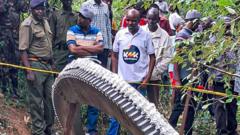An unsettling afternoon in Mukuku village turned into an extraordinary spectacle when a loud boom echoed through the air, prompting residents to speculate whether a bomb had exploded or a plane had crashed. Stephen Mangoka, a local farmer, was bewildered at the sudden noise, only to discover that a large, heated metal object had descended from the sky, leaving a lasting impression on the community.
Upon investigation, it was revealed that the massive circular object, weighing over 500 kg and measuring approximately 2.5 meters in diameter, had landed on farmland near a dry riverbed. Ann Kanuna, the landowner, relayed that the object was so hot upon arrival that locals had to wait two hours for it to cool before approaching. Curiosity gripped the community, who flocked to witness this mysterious space anomaly.
The tremendous interest in the fallen object prompted local authorities to alert the Kenya Space Agency (KSA) for assessment. Fearing theft, villagers along with police kept a vigil overnight, ensuring no one would abscond with the piece of both local lore and potential space history. As day broke, a media frenzy and even larger crowds gathered to catch a glimpse of the enigmatic object.
Preliminary reports from the KSA suggested the debris was a "separation ring" from a space launch rocket, typically intended to disintegrate during atmospheric re-entry or land in uninhabited areas, like oceans. No injuries were registered, but some villagers reported cracks in their homes, raising alarm over potential structural damage and calls for government compensation.
Concerns regarding radiation exposure due to the metallic object were voiced by the locals, though radiation assessments from the Kenya Nuclear Regulatory Authority later confirmed that levels were not harmful. Meanwhile, KSA experts continued to study the object, which might have orbited Earth for 16 years prior to its unplanned landing in Mukuku.
Similar incidents of space debris make this falling object not an isolated case. Just over a year ago, debris was reported to have fallen in Uganda, and more arcs of space junk are anticipated as the industry grows. As the risk of such events escalates, concerns among the Mukuku residents linger about future occurrences and the threat posed by unrestrained space activities.
"We need assurances from the government that it won’t happen again," said local resident Benson Mutuku. In light of the growing global space debris crisis—an accumulation of over 6,000 tonnes of junk orbiting the planet—the Kenyan government may find it increasingly imperative to establish better tracking methods and contingency plans to protect its citizens from potential fallout caused by errant space materials.















